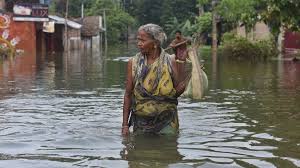
Sultan Al Jaber, the head of the state-owned Abu Dhabi National Oil Company (ADNOC), is facing growing pressure to step down as the president of the 28th Conference of Parties (COP28) to the United Nations Framework Convention on Climate Change (UNFCCC), which will be hosted by the United Arab Emirates (UAE) in November 2023

Climate change will put billions of people outside the 'human climate niche' where humans have thrived for ages, a new study has revealed. Extreme heat will force 600 million Indians out of their climate niche, exposing them to unbearable temperatures by 2030, it added.

A recent study highlights the alarming vulnerability of the Nilgiri marten (Martes gwatkinsii), a rare species of marten endemic to the Western Ghats, due to the significant encroachment of its habitat by development and agriculture. The study, titled

A new study published in the journal Nature Climate Change has found that climate change made the deadly heat wave that hit India, Bangladesh, Laos, and Thailand in April at least 30 times more likely. The study, which was conducted by an international team of scientists, used computer models to simulate the weather conditions that led to the heat wave. The models showed that the heat wave would have been much less likely to occur without climate change.

The G7 countries have set a 2070 net zero target for "major economies" and urged countries such as India and China to achieve the same by 2050. This is a significant step, but it is important to note that it is not new for rich nations. The G7 countries are already some of the world's largest emitters of greenhouse gases, and they have a responsibility to lead the way in the fight against climate change. However, it is also important to remember that India and China are still developing countries, and they need time to transition to a clean energy economy. The G7 countries should work with India and China to ensure that they have the resources they need to meet their climate goals.

According to the India Meteorological Department (IMD), an alarming 78% of districts in India are currently experiencing arid conditions, which may have adverse effects on summer crops. Out of the approximately 691 districts mapped, only 116 were classified as non-arid, while the remaining 539 districts faced varying degrees of aridity, ranging from mild to severe. Unfortunately, data for 36 districts was unavailable at the time of reporting.

The Ker and Sangri, popularly known as the "desert berry," which is an essential fruit staple in Rajasthan, is facing a grave threat due to unusual weather patterns that experts believe are linked to climate change. The fruit grows on the Khejri tree, which is considered a lifeline of the desert due to its ability to grow in arid conditions and its nutritional value. However, this year's atypical rainfall in Rajasthan has adversely affected the growth of the Khejri tree and, consequently, the desert berry.

Tourism companies in Dubai and India are urging for immediate action to lower the carbon footprint of the industry. They say that it is now time to work towards net-zero travel goals, and that this can be accomplished through a mix of measures, such as investing in renewable energy, enhancing energy efficiency, and promoting sustainable travel practices.

India is one of the most vulnerable countries to climate change. It is a fast-growing country with a large population, and it is already experiencing the effects of climate change, such as increasing temperatures, rising sea levels, and more extreme weather events. These effects are having a significant impact on India's economy, environment, and society.

A new study published in the journal Science reveals that more than half of the world's large lakes and reservoirs have experienced substantial shrinkage since the early 1990s due to the climate crisis and unsustainable human consumption. The research, conducted by an international team of scientists, highlights the concerns surrounding water supply for agriculture, hydropower, and human consumption.